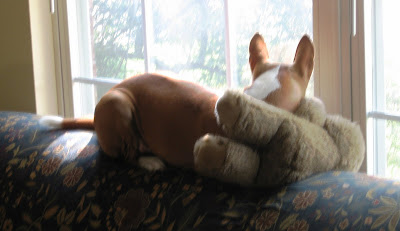 We learned about hypothyroidism with our first-born basenji Reno. Reno began to gain weight and the hair along his sides started to thin. I did a bit of homework, found these were classic symptoms of hypothyroidism, and off we went to the vet. I discovered hypothyroidism is a hormonal disorder that affects a dog's entire body, and can have very serious consequences if left untreated. Proper diagnosis and treatment can make a significant improvement, and hypothyroidism is fairly easy to treat. Often a thyroid test is among the first steps to find the cause of behavior changes.
We learned about hypothyroidism with our first-born basenji Reno. Reno began to gain weight and the hair along his sides started to thin. I did a bit of homework, found these were classic symptoms of hypothyroidism, and off we went to the vet. I discovered hypothyroidism is a hormonal disorder that affects a dog's entire body, and can have very serious consequences if left untreated. Proper diagnosis and treatment can make a significant improvement, and hypothyroidism is fairly easy to treat. Often a thyroid test is among the first steps to find the cause of behavior changes. Blood tests revealed Reno did indeed have low thyroid levels, and we started him on Soloxine. There was a definite change for the better after we started the supplements.
Some of the more common symptoms of hypothyroidism include :
Hair loss
Lethargy
Weakness
Weight gain
Coat change
Behavior changes
Cold intolerance
Dry skin, recurrent skin infections
Seizures
Cardiac Abnormalities
Gastrointestinal Disorders
Reproductive disorders
http://pethealth.petwellbeing.com/wiki/Dog_Hypothyroidism
Ivan is our second basenji with hypothyroidism. He has been taking Soloxine (levothyroxine) for several years as a replacement for the hormone that the thyroid gland normally produces to regulate the body’s energy and metabolism.
Our vet in Florida carried the brand name Soloxine, and we learned that different brands of levothyroxine may not work the same. Long time basenji enthusiasts recommend against using generic medication. Our current vet does not stock Soloxine, so we ask for a prescription and order it from a reputable source.
Thyroid medication is relatively inexpensive and has always been easy for us to dispense as Ivan, like Reno before him, can be bribed with food. Ivan gets his pills in a small dab of sweet potato one hour before he eats. I just say “Thyroid pill” and the Munchkins appear in the kitchen. Dasa gets a placebo bit of sweet potato when Ivan gets his pill. Giving the pill one hour before or two hours after meals appears to increase its effectiveness.

BRAT’s recommendation for checking your Basenji’s thyroid levels:
Have the vet draw blood and send it to Dr. Jean Dodds of Hemopet. You can find out what test to ask for and where the sample should be sent by going to:
http://www.canine-epilepsy-guardian-angels.com/DrDoddsInfoForm.htm
Be sure that you order the complete thyroid panel D8T (T3, T4, Free T3, Free T4, T3 auto antibodies and T4 auto antibodies)
Our current vet practice was very helpful about sending serum to Hemopet for testing. I made a few phone calls to Dr. Dodds’ staff at Hemopet to check on shipping details, and then sent Dasa’s serum. After her blood draw I took Dasa home by way of the Dairy Queen drive through for a hamburger to reward her for being such a good girl. I then picked up the serum and per their instructions, sent it overnight to Hemopet in California. (The Hemopet staff person I talked to said a lot of people even use priority mail, but I felt better using the overnight option.) Dasa gets tested regularly, and Dr. Dodds’s tests revealed that Dasa’s thyroid levels are still normal.
Then I took Ivan in for a blood draw and sent his serum. Within a week, we got the results. This full panel of tests provides our vet with the information needed to adjust Ivan’s medication to the correct level. We would perform any complicated arduous task needed to keep our Munchkins healthy, so we don’t hesitate to do this simple thing to care for them.
Thanks for this super important information. My Shiba is hypothyroid, but I first learned about the condition from Basenji people. Getting him proper treatment made a huge difference in his behavior, not to mention his physical symptoms!
ReplyDeleteI will say, however, that not all vets are willing to work with Dr. Dodds' lab, nor do they even have thyroid issues on their mind when diagnosing dogs. Our Shiba was seen for allergies allergies allergies, and the vet never bothered to consider thyroid issues; it was something I had to bring up. Even on the day of the blood draw they were insisting we go see their dermatological specialist, and suggesting that sending the blood results to Hemopet instead of their own lab was a bad idea. Just one of several reasons that one is no longer my vet...
We gotta keep our Munchkins healthy, after all, and we know them best! =)